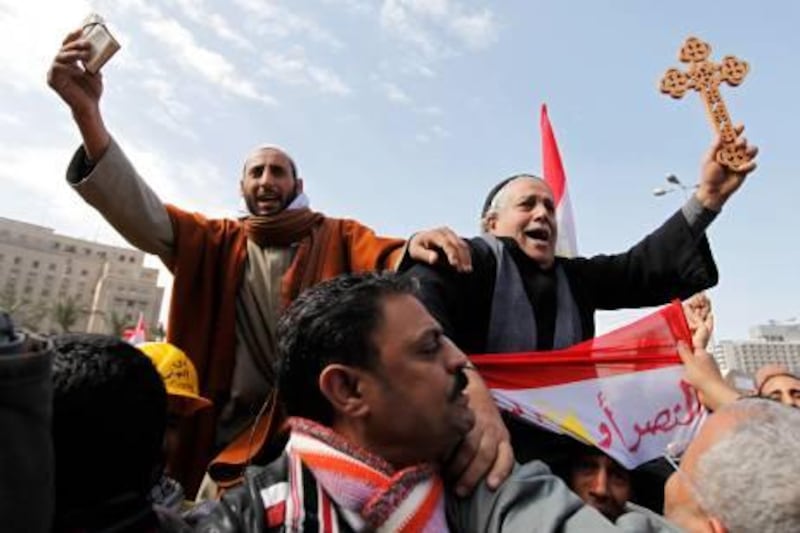CAIRO // Egypt's vice-president, Omar Suleiman, held unprecedented talks yesterday with the banned Muslim Brotherhood and other opposition groups in an effort to chart a way forward for Egypt after 13 days of protests against the regime of Hosni Mubarak.
As the government pleaded for protesters to return to work, tens of thousands appeared to be digging in their heels in Tahrir Square, where they marked a "Day of Martyrs" for at least 300 people the UN says may have been killed in clashes in the past two weeks.
The protesters shrugged off an unseasonable cold snap gripping the Egyptian capital and vowed not to give up their battle to oust President Mubarak, who has said he will stay on until elections in September.
In a telephone call yesterday to the US president, Barack Obama, Sheikh Mohammed bin Zayed, the Crown Prince of Abu Dhabi and Deputy Supreme Commander of the Armed Forces, stressed the need for the transition in Egypt to be "smooth and organised and carried out by national institutions, taking into account, at the same time, constitutional requirements of the next phase".
The Crown Prince emphasised that Egypt's future should be decided by Egyptians and be free of any "foreign interference".
The decision by Mr Suleiman, the country's intelligence chief and a longtime Mubarak ally, to meet the Muslim Brotherhood, Egypt's most organised opposition group, is testimony to the ground protesters have gained. Before the protests started on January 25, members of the Brotherhood were regularly rounded up and jailed.
_________________________________
[ EGYPTIAN UNREST: CLICK FOR THE FULL STORY SO FAR ]
_________________________________
After the talks yesterday, however, the Brotherhood said an offer by the regime to include opposition members on a panel to pilot democratic reform does not go far enough.
"Our demands are still the same. They didn't respond to most of our demands. They only responded to some of our demands, but in a superficial way," said a senior Brotherhood member, Essam al Erian.
The talks are the first known discussions in years between the government and the Brotherhood, which provides social services to the country's poor and whose members serve in parliament as independents.
Mr Suleiman said the government was mapping out a peaceful transition of power and called on Egyptians to stop protesting and return to their jobs and everyday life.
"We cannot do more than that. We cannot push them by force. Everybody has to go home. We want to have normal life. We don't want anybody in the streets. Go to work. Bring back once again the tourists. Go to the normal life. Save the economy of the country," he said in a US television interview.
Mr Suleiman said he could not, and would not, run for president after Mr Mubarak stepped down.
In Tahrir Square, thousands joined noon prayers to honour the "martyrs" killed in the bloodshed of the past few days.
Many have started using pieces of plastic to build temporary shelters or have put up tents to fend off the cold and light rain, and the area now resembles a teeming shanty town. Near the Museum of Egyptian Antiquities, which borders the square, people slept under several parked tanks.
The commander of the army, which many say holds the key to Egypt's future, toured the square yesterday to try to persuade the protesters to leave. "We want people to go back to work and to get paid, and life to get back to normal," said Hassan al Roweny.
However, most protesters did not appear to be in a mood to compromise on their demand that Mr Mubarak leave immediately. "We won't leave Tahrir Square except as corpses and martyrs, or else as people whose demand has been met - the total end of this regime," said Mohamed Abdel Latif, 39.
Mohamed el Zomor, 63, a professor of metallurgy and mining at the Tabbin Institute for Metallurgical Studies and a Muslim Brotherhood member who said he was arrested and held in a military jail for three years between 2001 and 2003, said: "Of course there should be discussions between the opposition. But the people see the first step as Mubarak leaving and resigning. Then they can negotiate with Suleiman."
Mohamed ElBaradei, who has emerged as a spokesman for the opposition, said there was a "hard core" who would never give up their protest in Tahrir Square and other cities around Egypt until Mr Mubarak stepped down. He said he was anxious about more violence.
However, Mr ElBaradei told US television he was "not invited" to take part in negotiations yesterday on the future of a post-Mubarak Egypt, and criticised the talks as "opaque".
Mr Mubarak has responded to the protests by pledging to step down after a presidential election due by September.
In another apparent gesture toward the protesters, members of the ruling National Democratic Party's executive committee, including Mr Mubarak's son Gamal, resigned on Saturday. But the Egyptian president remains the party's chief.
The Brotherhood said the mass resignation was a ruse to "choke the revolution".
Normal life was starting to return to parts of Cairo yesterday despite the protests. A steady stream of employees flowed into the city's financial district and customers queued to access their accounts on the first day that banks opened after a week-long closure.





